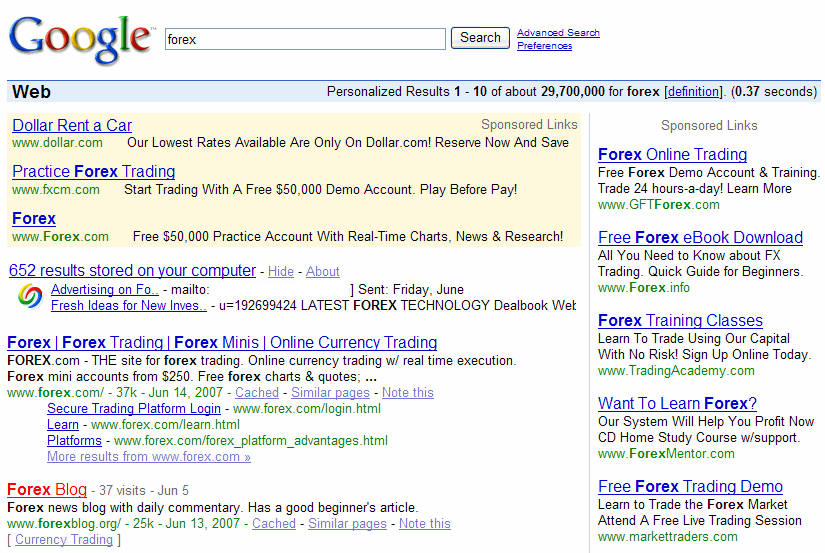Ad Relevancy & Quality Scores
Google has again and again touted the value of their targeted marketing, but most of the fortune 500 ad dollars are not spent on targeted marketing. A couple weeks ago in a WebmasterWorld thread many advertisers complained about getting killed by another quality score update.
What quality score actually means probably comes down to one of two things
- your site is a thin affiliate site or something else they once needed to fill a market niche but now is viewed as noise
- you have not created enough organic value and/or have not yet spent enough money building your brand
Google Hates Most Affiliate Websites
Some key quotes from the WMW thread...these two show the trend against affiliate sites in general
Too many outgoing affiliate links and you are toasted
So on my basic two types of sites, when I send the visitor to another domain to buy, I'm getting severly penalized ( a new affiliate "penalty"), but if I have a another party's lead form on my domain, I didn't get hit.
and this one shows that the change is not a short term one
A Google Adwords customer service rep said that they do not systematically target affiliates as a whole, nor sites with affiliate links. But, she said they are taking more steps with each landing page tweak to weed out sites that do not add a certain level of "value" to their visitors (as other posters to this thread have mentioned). She wouldn't tell me if this "value" is human-determined or algo-determined, again saying that she didn't know.
If your site is not the type of site they would white-list in the organic results eventually they are going to look to dispose of your position in the ads as well. As soon as enough brand advertisers find your space you are no longer needed. Thanks for sharing the keyword data needed to tell the brands what to bid on, and best of luck getting traffic from somewhere else.
If you want to see where paid search quality filtering is headed, look at how the organic algorithms have changed. Nothing better to glimpse the future of PPC than to read the documents about how they expect humans to rate organic search results.
Expanding the Role of Brand Related Advertisements
In that same WMW thread Skibum posed the following question
Why attack long time advertisers regardless of their business model who are providing consumers with what they are looking for while using broad match to show more ads triggered by keywords they were not intended to run on?
I recently saw a Dollar rent a car ad at the #1 ad position for Forex, which is not a cheap keyword.

As the day passed Google's CTR numbers showed they expanded that ad out too far and they made that ad less broad. They can automate spreading out brand ads too far, and then pull them back if the relevancy scores are too poor.
When it comes down to it, it is all about money. As Google commoditizes everything that is not a brand they need to collect more money from brands. The reason Google is pushing video hard is because they want to lead that ad market. It is no suprise to see Google leading in innovation in the video ad field. There is no better way to create inventory than to get it from your already established near infinite traffic stream.
The Cadillac Escalade video ads are taking the place of the textual Ford Explorer ads. Google has no brand allegence. Whoever is willing to overpay for exposure right now can buy all they want from Google.
Even when Google can show relevant ads, they still prefer to show brand ads if they think they will pay more. Consider a Michigan counties page where Google shows the following ad links.

Those are relevant. But what ads does Google also target to that page?

A lot of car donation charities are non-profit shells wrapped around dirty high margin auction houses (just look at the $20/clicks ad pricing).

A pharmaceutical ad from a company with a patent an a marketing budget larger than their research budget.
"The most startling fact about 2002 is that the combined profits for the ten drug companies in the Fortune 500 ($35.9 billion) were more than the profits for all the other 490 businesses put together ($33.7 billion)." - Marcia Angell
Given that ad targeting, it doesn't seem that Google is so pure, does it? One of the guys at WMW said the following
You guys are AdWords arbitrageurs. Although I'm sorry that your little gravy grain went off the rails, as a Google user, I can say good riddance to your garbage Web sites. Google, and users, want actual retailers to come up top in search results for sellers of a product, not parasite Web sites linking to actual retailers.
In a few years that same guy will probably be whining about how Google destroyed his business, but just like the other websites that died, Google doesn't care about him. What they want is decent relevancy WITH as much profit as legally possible. The more they cut out middle men the bigger they can make their chunk, even if doing so hurts relevancy and result diversity.
How do they get any more efficient than automating ad targeting while turning the text link into an unmarked ad unit? And they have patents for ad targeting based on how big of a risk taker you are:
"Examples of information that could be useful, particularly in massive multiplayer online RPGs, may be the specific dialogue entered by the users while chatting or interacting with other players/characters within the game. For example, the dialogue could indicate that the player is aggressive, profane, polite, literate, illiterate, influenced by current culture or subculture, etc. Also decisions made by the players may provide more information such as whether the player is a risk taker, risk averse, aggressive, passive, intelligent, follower, leader, etc. This information may be used and analyzed in order to help select and deliver more relevant ads to users."
How can anyone else compete in the ad market?


